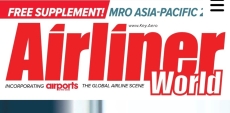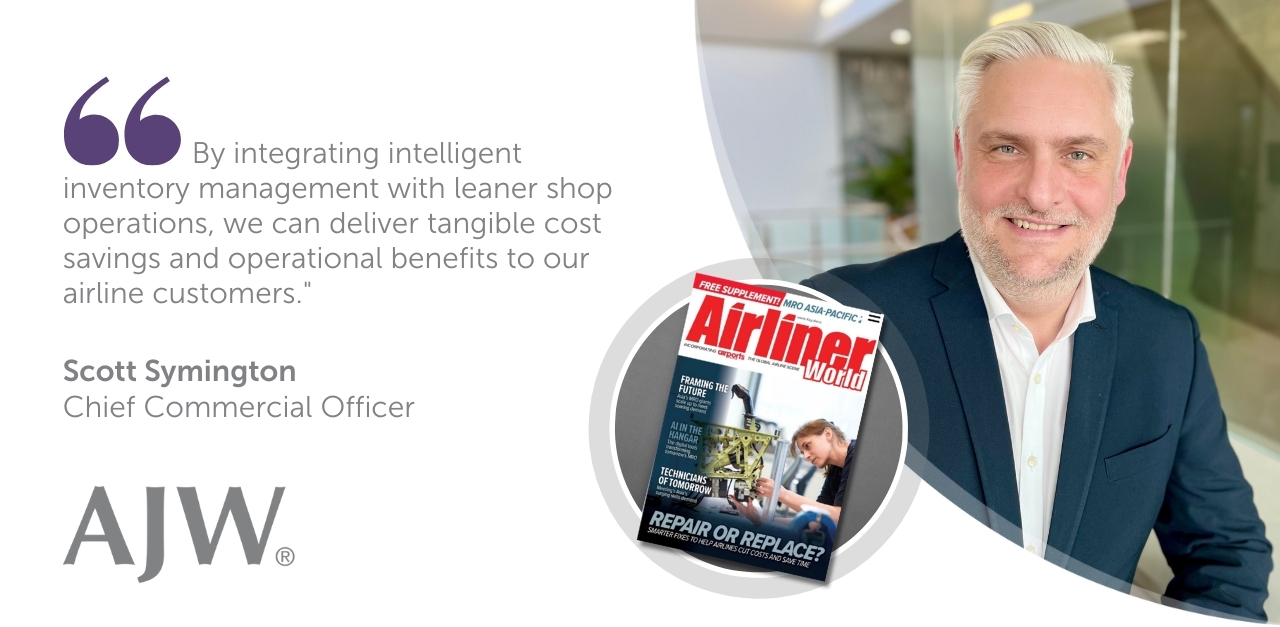

24/7 AOG Critical Response
Hotline![]() UK +44 1403 798888US +1 877 780 2008
UK +44 1403 798888US +1 877 780 2008
Our award winning global AOG service is manned 24 hours a day, 365 days a year.
Please call +44 1403 798888 or email aog@ajw-group.com.

16 Sep 2025

Airlines have long taken advantage of the significant cost savings made from repairing and overhauling components, rather than buying a brand-new replacement. Amidst the supply chain challenges that have characterised the past 5 years, how are MRO providers adopting cost-effective strategies for component repairs? Airliner World investigates.
Airliner World Magazine speaks to Scott Symington, Chief Commercial Officer at AJW Group, about the trends he is seeing in the repair market and whether cost saving has become a high priority.
“Customers consistently ask their MROs to identify the most cost-effective solutions, often preferring component repairs over full replacements,” confirms Symington.
“Traditionally, some customers and regions have relied exclusively on OEM support and factory-new components. However, we are now seeing a clear shift: these same customers are increasingly turning to third-party MROs and USM as a means of reducing costs,” he expands.
How much of this is down to supply chain issues, asks Airliner World?
“When it comes to repairs, the OEM supply chain for piece parts, components, and repair services has shown little improvement,” says Symington. “Here we are, midway through 2025, three and a half years post-Covid, and the situation remains largely unchanged.”
As a result of this landscape, the Chief Commercial Officer states that AJW is continually working with customers to identify and develop alternative repair solutions that both mitigate ongoing supply chain challenges and deliver the most cost-efficient outcomes.
Airliner World enquires about AJW Group’s new initiatives aimed at enhancing the bottom line of their airline customers.
Symington shares that AJW has enhanced the internal processes and overall efficiency within its MRO to eliminate waste and reduce turnaround times. These enhancements include a new in-house inventory management system that leverages artificial intelligence to monitor a wide range of parameters. “This system provides real-time oversight across all aspects of our inventory, from individual piece parts to our MRO operations at AJW Technique... it operates continuously, every moment of every day, enabling far greater visibility, responsiveness, and control.”
“By integrating intelligent inventory management with leaner shop operations, we are better positioned to manage parts availability and accelerate repair cycles, ultimately delivering tangible cost savings and operational benefits to our airline customers,” he concludes.

Airliner World asks Symington if he believes that some legislative barriers are outdated, and whether more repairs could be developed if these were revised.
Confirming that he does feel there are several regulatory and contractual obstacles that limit the wider adoption of cost-effective repairs, Symington states that “even where repairs have been fully developed and approved, whether under FAA or EASA frameworks, there remain legislative barriers that prevent some national airworthiness authorities from recognising and adopting those approvals.”
“At present, there is no automatic adoption, and red tape continues to delay or block viable solutions.” He proposes that a more collaborative, cross-authority standard allowing mutual recognition of such repairs would significantly streamline the process.
Other than its use in your inventory management systems, is AJW deploying AI elsewhere in its operations, asks Airliner World?
“AJW has been on a three-year transformation journey, focused on redefining aviation efficiency through the integration of artificial intelligence across our operations,” says Symington. “We’re deploying AI in a wide range of areas, including automated quoting and pricing, and the development of an in-house AI platform.”
“We’re preparing to run our repair sourcing RFPs through this in-house AI platform, which will significantly enhance the speed and accuracy of responses, streamline the entire procurement process, and improve order turnaround. The result is a much more agile and responsive business model that brings us closer to our customers while also delivering a competitive cost advantage,” he shares.
“Our use of AI is not simply about automation, it’s about enabling smarter, faster decision-making across the board to support our customers more effectively and drive greater operational efficiency,” finishes Symington.
Want to speak to us about your repair management? Click here to book a meeting with Scott Symington, or another member of our team, at MRO Asia-Pacific 2025.